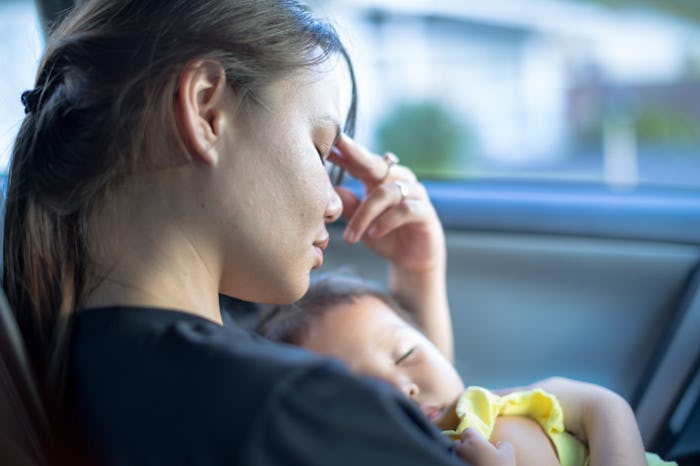Pregnancy
Here's How Long Postpartum Depression Can Last, According To An Expert
Giving birth can be an incredible experience, but the period that follows can often bring about unexpected challenges—including in how you feel. That doesn't mean that experience is "picture perfect," though. And since there's really no reason to know, for sure, how pregnancy, labor and delivery, and postpartum will go for you, it's important for all soon-to-be parents to know about postpartum depression (PPD), including how long postpartum depression lasts.
Postpartum depression is one of a number of perinatal mood and anxiety disorders (PMADs) that a new parent can experience. It can begin anytime during the first year of your baby’s life, according to the American College of Obstetrics and Gynecology (ACOG). While symptoms generally begin around one to three weeks post-childbirth, MayoClinic states that symptoms can even begin during pregnancy. though it generally begins around one to three weeks post-childbirth. This is different from the “baby blues,” which occurs in about 80% of all postpartum individuals, according to the National Institute of Mental Health, and includes symptoms like anxiety, sadness, irritability, and trouble with concentration. It can be difficult at first to know whether or not it’s PPD or just baby blues, Generally speaking, “baby blues” can last about one to three weeks after childbirth, but once symptoms go beyond this, it's time to speak with a health-care provider.
“The onset of postpartum depression can vary from person to person,” Dr. Venus Mahmoodi, Ph.D, a psychologist who specializes in reproductive and maternal mental health at the Seleni Institute, tells Romper. Dr. Mahmoodi says she generally encounters patients between three and six months postpartum having symptoms of depression.
ACOG state that your levels of the hormones progesterone and estrogen fall quickly in the first postpartum hours, which can trigger the start of feelings of depression. But that’s only one of numerous factors that can trigger or exacerbate PPD. Susana Marquez, Maternal Mental Health Clinician at Wellness Para La Mama, says how long postpartum depression lasts can depend on a number of factors.
"Is (the) mother being supported? Have her symptoms decreased or intensified? Is she receiving mental health support, and if so, how consistent and beneficial has it been for the mom. Any new stressors affecting mom need to be evaluated in how she is feeling or functioning," says Marquez.
For example, while most individuals experience PPD due to genetics and/or hormone changes, other things can exacerbate the condition. Alcohol and drug abuse, and stressful life events (such as domestic violence, a death in the family, or personal illness) can also be contributing factors in PPD, according to the The National Institute of Mental Health. This means that those facing additional challenges might experience symptoms that can last longer than those who are able to meet all their needs earlier.
“If someone has a history of PPD, depression, anxiety, they will experience longer bouts of depression than someone who is experiencing it for the first time," Dr. Mahmoodi tells Romper. "The feeling of, 'Oh no, here it is again,’ can often lead to negative thinking patterns that perpetuate the depressive symptoms." Dr. Mahmoodi says that certain populations (including women of color) will also experience PPD for a longer period of time.
“Often, when there is systemic racism within healthcare systems, access to care is impacted significantly, whether it's being shuffled around to different clinicians, affordability, or bad clinicians. These vulnerable groups will like experience higher rates of depression, likely longer bouts of depression, and fewer resources,” Dr. Mahmoodi explains.
The length of postpartum depression also depends on whether one receives treatment for it, and how the patient responds to said treatment. One method of treatment, according to the ACOG, is the consumption of antidepressants. Upon taking medication, PPD symptoms can sometimes begin to improve within 3-4 weeks. Talk therapy, per the ACOG, can also help treat the symptoms of PPD, and therapy can prove effective within a few weeks. However, the ACOG also states that it could very well take upwards of several months to fully combat PPD.
“Without treatment, postpartum depression can last for years. I've worked with women who developed PPD after their first baby but didn't get it treated until three months into postpartum with their second. When PPD goes untreated, it takes much longer to treat. However, if someone seeks treatment when they first experience symptoms, they start feeling better within a few weeks,” Dr. Mahmoodi says.
While postpartum depression can last for years for women who have recurring pregnancies and births, once a person ceases to bear children, PPD won’t necessarily be labeled "postpartum" any longer.
"If it's been past two years after birth and there are still symptoms of depression, it's now time to look at a different or additional diagnosis," adds Marquez.
The most important thing to remember is that while there are no specific way to completely indicate how long PPD may last in a specific person, help is always out there. If you’re struggling with symptoms of PPD, reach out to both your OB-GYN and/or a trained mental health professional. You're not alone.
If you or someone you know is experiencing depression or anxiety during pregnancy, or in the postpartum period, contact the Postpartum Health Alliance warmline at (888) 724-7240, or Postpartum Support International at (800) 944-4773. If you are thinking of harming yourself or your baby, get help right away by calling the National Suicide Prevention Lifeline at 1-800-273-8255, or dialing 911. For more resources, you can visit Postpartum Support International.
This article was originally published on
